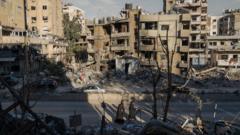Woven amid the rubble in southern Beirut, signs of erstwhile thriving businesses have become poignant reminders of the devastation wrought by Israeli airstrikes. In the devastated commercial district of Dahieh, a once-bustling car parts dealership is now reduced to a twisted and cracked metal sign that says, "Spare parts. Jeep Cherokee." Such destruction affects many business owners in the area, who believed their shops would remain untouched due to the locality's ordinary populace.
Amid the wreckage, Imad Abdelhak confronts anxiety and uncertainty about whether his garage, which survived a nearby strike, will need to be demolished. The conflict that erupted between Israel and Hezbollah has left Lebanese business owners reeling, with fatal repercussions for shops, warehouses, and inventories.
Even after a ceasefire brokered by the United States and France, business owners are facing the daunting reality of recovery. Ibrahim Mortada, a car parts dealer, lamented a loss of $20,000, stating emphatically, “I have no idea how we can survive.” The structural integrity of Mortada’s building is in question after suffering a direct strike, prompting fears of future collapse.
In addition to physical destruction, economic ramifications abound, as many businesses, like Ibrahim's, had provided livelihoods for decades. The shadow of Hezbollah looms over this desperate environment. The militant group has promised to assess damage and provide financial assistance for rebuilding while people anxiously await support.
They find little comfort from the government, with many feeling abandoned in their hour of need. Niran Ali, a shop owner from the city of Nabatieh, noted the absence of official outreach or aid. Ali's shop, Zen Baby Fashion, lay in ruins, with only a soot-stained piece of clothing remaining as a vestige of her enterprise.
The economic impact of the recent conflict is substantial. Estimates suggest that damages could reach $8.5 billion, heightening the post-crisis strain on Lebanon's already fragile economy, which has been recovering from a financial catastrophe and the Beirut port explosion in 2020.
Several Lebanese entrepreneurs express uncertainty regarding potential rebuilding support; many hope for the precedent set following the 2006 Israel-Hezbollah conflict, when aid flooded in. However, the current situation has left numbers of business owners, such as Jalal Nasser, with deep skepticism.
“We are counting on God to help us now,” Mortada reflected somberly, gesturing towards the wreckage. While the World Bank’s estimates present a grim outlook, the insistence of rebuilding and assurances from Hezbollah provoke a sense of wary optimism amid despair.
As the extent of damages weighs heavily, the longer-term prospects for recovery remain obscured, with some pledges from neighboring states uncertain. Yet, as local leaders like Yasin and UN representatives acknowledge the magnitude of reconstructive efforts needed, the push towards a revival of Lebanon’s economy becomes imperative. In Nabatieh, the scars of destruction elicit a call for immediate action, with private memories of painful losses mixing into the public reckoning of a city left in tatters.



















